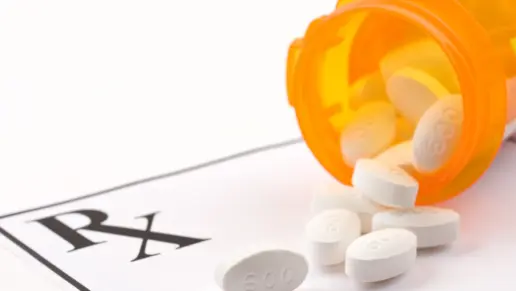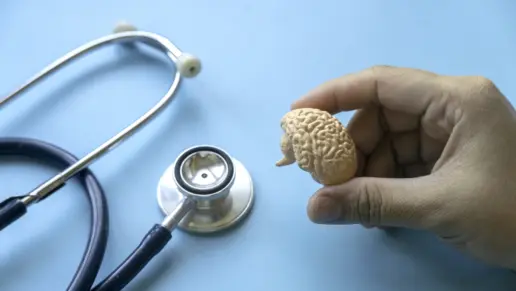Prescription stimulants are medications used to treat conditions like ADHD and narcolepsy. They can be effective when used as prescribed but they can also carry significant health risks including addiction.
What are Presciption Stimulants?
Stimulants are a class of substances with one characteristic in common. They speed up brain and bodily functions when consumed. These drugs stimulate the central nervous system by increasing your alertness, focus and energy levels. Their effects can vary depending on the individual and the specific medication.
Prescription stimulants like Adderall provide relief to many individuals who reap the benefits of their therapeutic value based on medical guidance. Others are prescribed appetite suppressants that contain stimulants to lose weight in order to decrease the risk of medical complications of obesity.
Some stimulants are found in over the counter medications. For example, certain nasal decongestants contain the stimulant pseudoephedrine.
Not all stimulants are medications. The nicotine found in cigarettes is also a stimulant. There are other common stimulants that might seem harmless in comparison. Millions enjoy their daily cups of coffee without realizing that the caffeine that gives them their morning jolt is a natural stimulant with energizing effects.
That’s not to say that caffeine is inherently dangerous. Some people rely on stimulants just to get through the day. Individuals often seek an extra energy boost as the pace of modern life accelerates and speed becomes the norm.
How do Stimulants Work?
Taking a prescription stimulant influences the central nervous system. Dopamine and norepinephrine levels are elevated to produce physiological responses. Stimulant effects are dual in nature which means that they impact the brain and the body.
You might feel a sense of euphoria when dopamine takes effect. Your heart rate accelerates and blood pressure increases as norepinephrine levels rise in your body. This results in the traditional stimulant-like effects that boost energy levels, concentration and attention.
It can be easy to fall into a trap of using stimulants anytime you feel down. Many stimulants are used in most cases. Cocaine and methamphetamine do have some medicinal value but they ruin thousands of lives every year. Legal prescription stimulants are misused and diverted for other purposes apart from their original uses. It’s fundamental to understand their proper use and potential dangers.
Common Uses and Misuses of Prescription Stimulants
It’s important to know that stimulants have a place in modern medicine. According to studies, about 3.5% of Americans under 19 and about 6.3% of adults are prescribed stimulants. Their effects can greatly benefit these individuals when prescribed and used appropriately within a physician’s care. Here are a few approved use cases.
ADHD Treatment: Prescription stimulants can help people with ADHD function better in their occupations and personal lives as they help improve concentration and reduce impulsivity for these individuals. ADHD stimulant medication still has psychoactive properties so misuse is possible.
Narcolepsy Management: Heightened alert and energy levels can help manage excessive daytime sleepiness in individuals with sleep disorders like narcolepsy which is marked by uncontrollable deep sleep episodes. Stimulants can also reduce obstructive sleep apnea. This is a condition that causes drowsiness throughout the day.
Appetite Suppression: Prescription stimulants are of value in assisting patients with binge eating disorders to reduce overeating behaviors due to their appetite suppressing properties.
Prescription stimulants are often misused for non-medical purposes which leads to addiction and other health problems. The misuse potential of prescription stimulants is recognized by U.S. government agencies. The FDA has classified many stimulants as Schedule II drugs under the Controlled Substances Act due to their elevated risk of misuse, diversion, addiction and overdose.
There’s a dangerous pattern behind the misuse of stimulants. It’s a fact that individuals frequently consume them without a prescription or in ways that differ from the recommendations of the manufacturers who formulate them and physicians who prescribe them.
Stimulant misuse numbers aren’t minor. An estimated 45.2% of young adults between the ages of 18 to 25 misuse them yearly according to one 2021 report from SAMHSA. Why are so many young individuals abusing prescription stimulants?
Behind these alarming numbers lies a dangerously common misunderstanding. A major misperception is the idea that prescription stimulants are “smart drugs” that help individuals without ADHD or a sleep disorder become more productive at work, get better grades or enhance their cognitive abilities. This is not true as several studies have indicated.
How do people get access to prescription medication? According to research, 50-90% of individuals get ahold of them through diversion involving family or friends who have a prescription.
The Risks of Misuse
Stimulant use disorder is defined as a harmful pattern of stimulant consumption. It’s a significant problem. Approximately 4.5 million individuals in the U.S. struggled with stimulant misuse in 2022 according to the CDC.
Abusing prescription stimulants can have serious consequences, including:
Heart Problems: Stimulants are hard on the heart. Increased heart rate, elevated blood pressure and irregular heartbeat can strain the cardiovascular system. Heart attacks, seizures and even sudden death are all real threats that can result from the abuse of these drugs.
These side effects also frequently occur in those who use prescription stimulants not prescribed for them and in those who combine stimulants with other substances such as alcohol.
Sleep Disturbances: Insomnia and sleep difficulties are common side effects of stimulant abuse because their consumption may disrupt sleep patterns.
Gastrointestinal Effects: The gastrointestinal system suffers from the excesses of stimulant abuse. This can manifest in symptoms like diminished appetite, excessive weight loss, constipation, nausea and abdominal pain.
Psychosis and Other Neurological Consequences: The dangers of misusing stimulants compound with repeated use. Stimulant abuse can induce psychotic symptoms such as hallucinations and delusions. These drugs can cause dizziness, tremors, restlessness, headaches, memory loss, problems thinking clearly and hostile mood changes that can transform a person, making them irritable and even violent.
Addiction: The rewarding effects of stimulants can lead to dependence. The human mind and body can get used to the stimulant effects of these drugs which creates a situation where people depend on stimulants to function daily. If that person stops consuming the stimulants they’re addicted to then they can experience withdrawal symptoms like extreme mood swings, anxiousness and hallucinations.
Addiction also increases the risk of overdose. Yearly deaths associated with stimulant consumption grew from 12.122 to 57,497 between 2015 and 2022.
Researchers have also found that nonmedical use of amphetamine like prescription stimulants increases the incidence of emergency department visits. An increasing number of emergency room visits dramatically showcases the perils of misusing these drugs.
Responsible Use of Prescription Stimulants
If you’re thinking about taking prescription stimulants then it’s essential to follow the directions from licensed healthcare providers. Open communication with your doctor is crucial. You’ll learn how to watch out for side effects and they’ll adjust your treatment as needed.
Tthe risk of misusing prescription stimulants drastically falls when individuals follow their plan of care as prescribed by a qualified physician.
Too many people decide to take stimulants on their own. They don’t know that stimulants interact with other substances which leads to high blood pressure, irregular heartbeats and other dangerous side effects. It’s always best to follow your doctor’s orders.
Many individuals buy prescription stimulants in illegal markets and expose themselves to life threatening risks. Unfortunately, they don’t often know what they’re actually getting from dealers. Unregulated drugs are often contaminated with other substances like fentanyl and are the main drivers of involuntary overdoses.
If you or someone you know experiments with prescription stimulants for recreational purposes or because they think they can benefit them then remember this: Medical help is available.
If you do have trouble concentrating or being organized then talk to your doctor. They’ll help you identify those root causes and offer healthy options to best address those triggers. If your doctors decide medication could help then they will prescribe one that minimizes risks for you and adjust the dosing based on your individual situation.
Do not self medicate. Your health is too important to risk on meds not meant for you.
Many people who want help with stimulant misuse understandably don’t know where to begin, but supportive programs do exist. If you’re exploring treatment options or just want a clearer picture of what care looks like, you can learn more about rehab options and find services that match your needs.
Featured Facilities Near You
Finding facilities near you…




